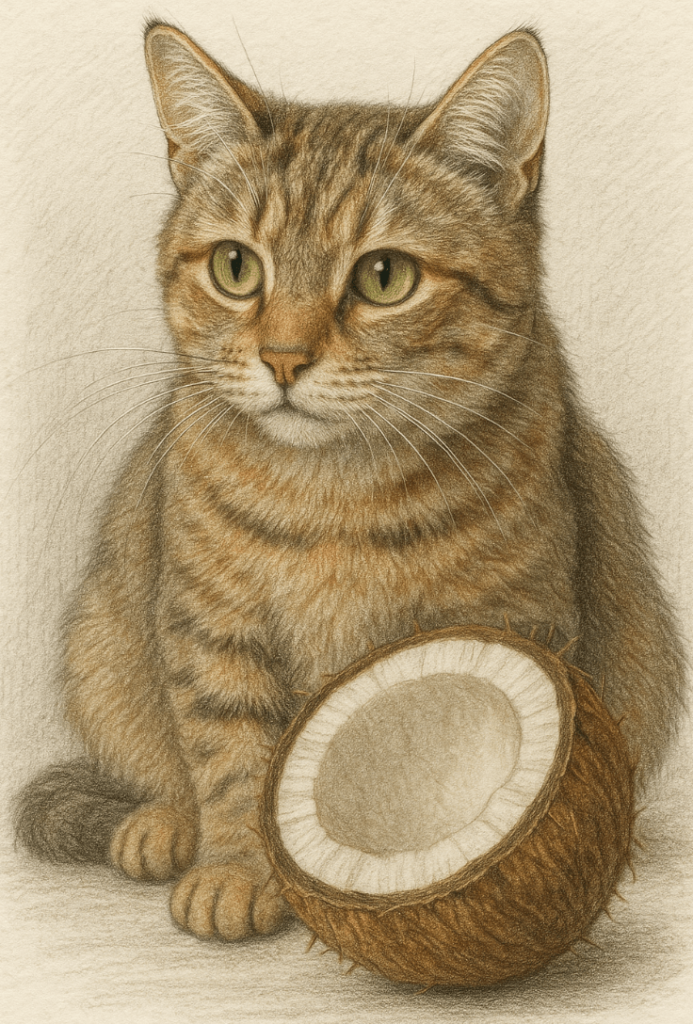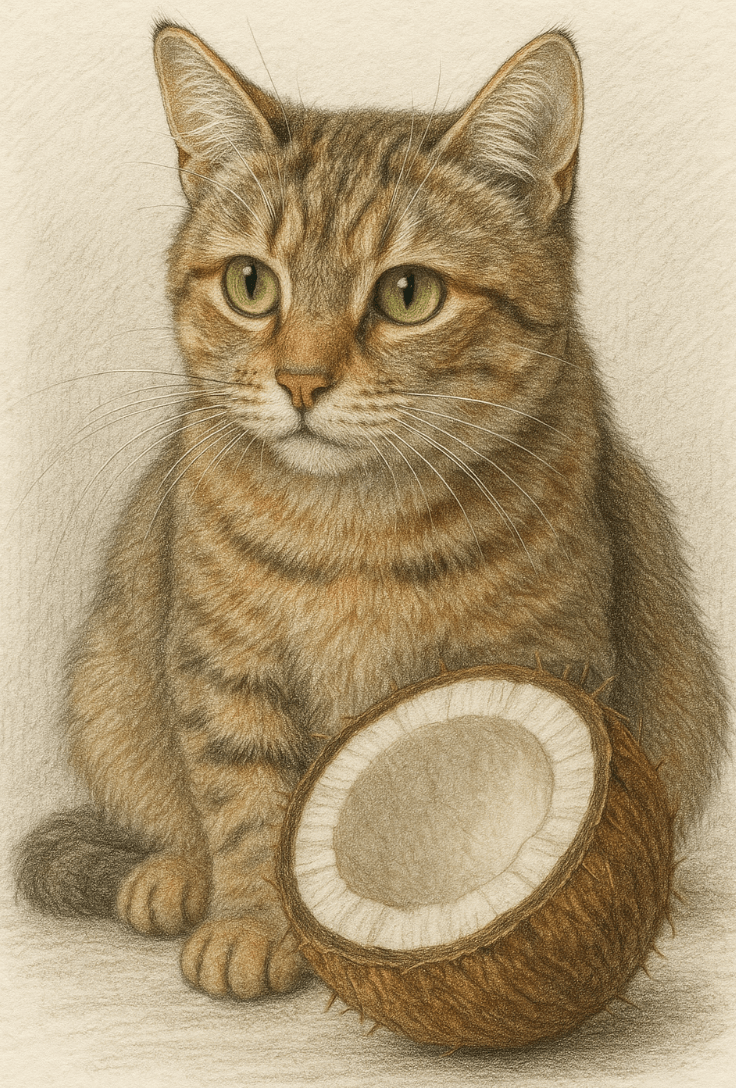Can Cats Eat Coconuts? What You Need to Know
Coconuts are often hailed as a superfood for humans, packed with nutrients and healthy fats. But when it comes to our feline friends, the question arises: can cats eat coconuts? While cats are obligate carnivores and primarily rely on animal-based proteins, they may occasionally show curiosity about human foods like coconut. Understanding whether coconuts are safe for cats—and in what forms—is essential to ensure their health and well-being. In this blog post, we’ll explore the potential benefits, risks, and best practices for introducing coconuts into your cat’s diet (if at all). Let’s dive in and uncover everything you need to know about cats and coconuts.
Potential Benefits of Coconut for Cats
While cats don’t require plant-based foods in their diet, small amounts of coconut may offer some surprising benefits. However, moderation is key to avoid any adverse effects.
Healthy Fats:
Coconut contains medium-chain triglycerides (MCTs), which can support skin and coat health when consumed in tiny amounts.Antimicrobial Properties:
Coconut oil, derived from coconuts, has natural antimicrobial properties that may help combat certain bacterial or fungal infections.Digestive Aid:
Some pet owners report that small amounts of coconut oil can ease digestive issues like hairballs or mild constipation.Hydration Boost:
Fresh coconut water (unsweetened and unflavored) can provide hydration, though it should only be given sparingly.Shiny Coat:
The lauric acid in coconut oil may promote a glossy, healthy coat when used topically or ingested in minimal amounts.
While these benefits exist, it’s crucial to remember that cats have unique dietary needs, and coconut should never replace their primary nutrition.
Risks of Feeding Coconuts to Cats
Though coconuts can offer some advantages, they also come with potential risks that every cat owner should consider before offering them to their pet.
High Fat Content:
Coconuts are rich in fats, which can lead to obesity or pancreatitis if consumed in large quantities.Digestive Upset:
Too much coconut or coconut oil may cause diarrhea, vomiting, or stomach discomfort in cats.Allergic Reactions:
Some cats may be allergic to coconuts, resulting in symptoms like itching, swelling, or respiratory issues.Choking Hazard:
Hard pieces of coconut meat or shredded coconut can pose a choking risk if not chewed properly.Toxic Additives:
Processed coconut products with added sugars, salt, or flavorings are unsafe for cats and should be avoided entirely.
Understanding these risks ensures you make informed decisions about incorporating coconuts into your cat’s diet.
Check this guide 👉Can Cats Eat Eel? Best 7 Expert Tips!
Check this guide 👉Can Cats Eat Protein Powder? Best 7 Expert Tips!
Check this guide 👉Can Cats Eat Rambutan? Best 7 Expert Tips!

Safe Coconut Products for Cats | Unsafe Coconut Products for Cats |
|---|---|
Small amounts of plain coconut oil | Coconut products with added sugar |
Fresh, unsweetened coconut water | Processed coconut snacks |
Tiny bits of plain coconut meat | Coconut milk with additives |
Topical use of coconut oil | Flavored or sweetened coconut treats |
Moderation in all cases | Large chunks of hard coconut |
How to Safely Introduce Coconut to Your Cat
If you decide to give your cat a taste of coconut, it’s important to do so cautiously and responsibly. Here are some tips to ensure a safe introduction.
Start with Tiny Amounts:
Offer a very small amount—less than a teaspoon—to see how your cat reacts before giving more.Choose Plain Products Only:
Avoid anything with added sugars, salts, or artificial flavors, as these can harm your cat.Monitor for Allergies:
Watch for signs of allergic reactions, such as itching, swelling, or difficulty breathing, after introducing coconut.Use Coconut Oil Sparingly:
A drop or two of coconut oil mixed into food is enough; too much can upset their stomach.Consult Your Veterinarian:
Always check with your vet before adding new foods to your cat’s diet, especially if they have existing health conditions.
By following these guidelines, you can minimize risks while exploring whether your cat enjoys coconut safely.
Signs Your Cat May Not Tolerate Coconut
Not all cats will tolerate coconut well, and some may experience adverse reactions. Recognizing these signs early can prevent further complications.
Vomiting or Diarrhea:
These are common symptoms of digestive upset caused by consuming too much coconut.Lethargy or Weakness:
If your cat seems unusually tired or uninterested in activities, it could indicate an issue.Excessive Drooling:
Drooling may signal nausea or irritation from eating something they shouldn’t have.Skin Irritation or Itching:
This could indicate an allergic reaction to coconut or its components.Loss of Appetite:
Refusal to eat might suggest discomfort or illness related to consuming coconut.
If you notice any of these signs, stop offering coconut immediately and consult your veterinarian for guidance.
Common Misconceptions About Cats and Coconuts
There are several myths surrounding cats and coconuts that can lead to confusion. Clearing up these misconceptions helps ensure responsible feeding practices.
Coconut Is Essential for Cats:
Contrary to popular belief, cats don’t need coconut or any plant-based foods in their diet.Coconut Oil Can Replace Medication:
While coconut oil has some benefits, it cannot substitute veterinary-prescribed treatments for health issues.All Cats Love Coconut:
Just because some cats enjoy coconut doesn’t mean all will—it depends on individual preferences and tolerances.More Coconut Means Better Health:
Overfeeding coconut can harm your cat, so less is always better.Coconut Water Hydrates Better Than Water:
Fresh water remains the best source of hydration for cats; coconut water should only supplement occasionally.
Dispelling these myths ensures safer and smarter decisions regarding your cat’s diet.
Alternatives to Coconut for Cats
If you’re looking for other ways to enhance your cat’s diet without using coconut, here are some safe alternatives that align with their nutritional needs.
Cooked Chicken or Turkey:
Lean meats provide protein and energy without unnecessary fats or sugars.Pumpkin Puree:
Unsweetened pumpkin aids digestion and can help with hairball control.Fish Oil Supplements:
Omega-3 fatty acids from fish oil promote skin and coat health naturally.Herbal Teas (Cooled):
Chamomile or peppermint tea (without caffeine) can soothe upset stomachs when cooled.Fresh Watermelon (Seedless):
A small piece of seedless watermelon offers hydration and a refreshing treat.
These alternatives cater to your cat’s carnivorous nature while providing variety and nutrition.
Tips for Keeping Your Cat’s Diet Balanced
Maintaining a balanced diet is crucial for your cat’s overall health, regardless of whether you include occasional treats like coconut. Here are some tips to keep their nutrition on track.
Prioritize High-Quality Cat Food:
Choose premium cat food formulated to meet their specific life stage and dietary needs.Limit Human Foods:
Human foods should make up no more than 10% of your cat’s daily caloric intake to avoid nutritional imbalances.Avoid Harmful Ingredients:
Steer clear of foods containing garlic, onions, chocolate, or xylitol, as these are toxic to cats.Incorporate Variety Carefully:
Rotate treats or supplements slowly to monitor how your cat responds to new additions.Regular Vet Check-Ups:
Routine visits to the vet help identify dietary deficiencies or excesses early on.
By following these tips, you can ensure your cat receives a balanced diet that supports their long-term health and happiness.
Frequently Asked Questions About Cats and Coconuts
Is coconut oil safe for cats?
Yes, in very small amounts, but always consult your vet first to ensure it’s appropriate for your cat’s specific needs.
Can kittens eat coconut?
Kittens have sensitive digestive systems, so it’s best to avoid giving them coconut altogether.
How much coconut can I give my cat?
Limit intake to a few drops of coconut oil or a tiny piece of fresh coconut meat, no more than once or twice a week.
What happens if my cat eats too much coconut?
Overconsumption can lead to digestive upset, obesity, or even pancreatitis due to the high fat content.
Can coconut cure hairballs in cats?
While some claim coconut oil helps with hairballs, there’s limited scientific evidence; grooming and a proper diet remain the best solutions.
Making Smart Choices About Coconuts for Your Cat
While coconuts aren’t toxic to cats in small amounts, they’re not a necessary part of their diet either. As obligate carnivores, cats thrive on animal-based proteins, and any plant-based additions should be approached with caution. By understanding the potential benefits and risks, choosing safe products, and consulting your vet, you can ensure your cat stays healthy and happy. Remember, moderation is key—coconuts should be an occasional treat rather than a dietary staple. With careful consideration, you can determine whether this tropical treat is right for your furry friend.
Do Cats Have Taste Buds? Best 7 Expert Tips! – Discover how cats experience flavors and why their taste is so unique.
Do Dogs Have Taste Buds? Best 7 Expert Tips! – Discover how dogs experience taste, their preferences, and what it means for their diet and health.
Can Cats Taste Sweet? Best 7 Expert Tips! – Discover why cats can’t taste sweetness, how it affects their diet, and tips to keep them healthy and happy.
Can Dogs Taste Sweet? Best 7 Expert Tips! – Discover how dogs perceive sweetness, which foods are safe, and tips to manage their sweet cravings responsibly.





